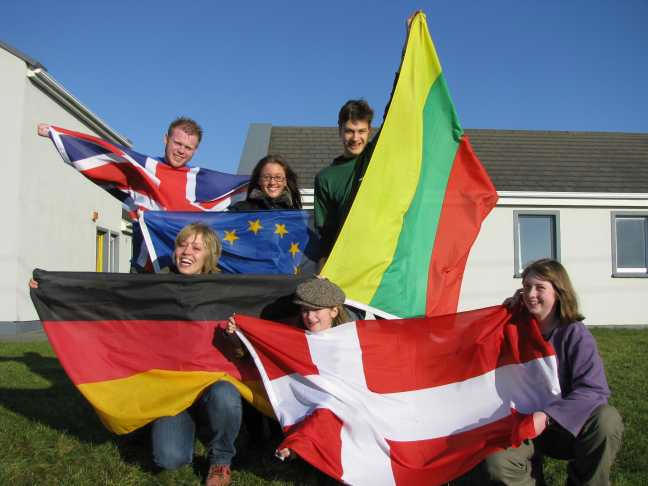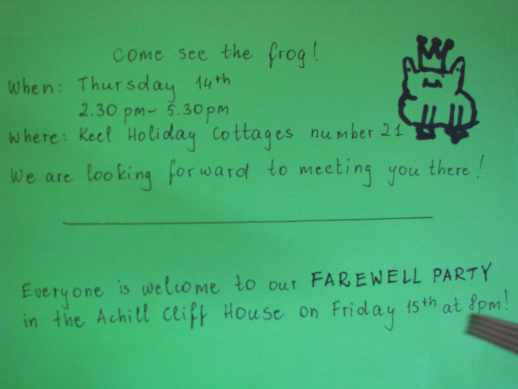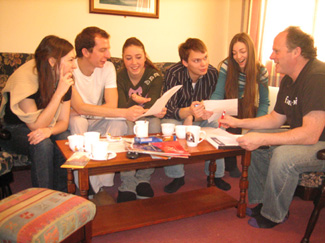|
Day 4 11 February 2008 |
||||||||
|
Select a day |
Europe Goes to School Workshop Today we were lucky enough to be invited into a local school. A nice yellow building not much bigger then the cottages in which we have been staying. As we walked inside the children's art work lined the corridor walls and after meeting the head teacher we were taken into the largest room of the school. It was different compared to schools I have attended before because there were 2 classrooms. The school had around twenty five students. The head teacher told us that they still have individual classes although there weren�t any students in the third grade. As the children came into the room they all had excited faces and the frog costume was an instant hit. At first we introduced ourselves and the country we had come from. They were all very aware about foreign cultures. Especially the English and the German. They correctly guessed where each of our flags was from and by a process of elimination also discovered about our local foods and sports. I then lead the class in a song very common in both our countries, �heads, shoulders, knees and toes�. They found this very enjoyable as did all of us. Then we split the group into two. The Lithuanians introduced their game where they had to dance around a central person and then copy what that person did. The German team did a game where the children walk ten steps and did some actions. Both games helped teaching the children basic foreign words. We then showed them to each other. We then discovered the class had a band and they entertained us with a short Irish song which they have been learning to perform for St. Patrick�s Day. I was amazed by how good they were. Afterwards they tried (unsuccessfully) to teach me some Irish dancing but were left in awe with Ugnius� break dancing. We ended the session by inviting them to our Thursday workshop and handing out German candy. All in all it was a fantastic day which I will remember for many years to come! Paul Raynes (English Group) |
|
||||||
|
First day of Immigration Workshop Five enthusiastic students from 3 different nationalities gathered this morning in one of the Keel Holiday Cottages to kick off their one week workshop dedicated to the topic of immigration. The small group led by Dr. Scott DeFrancesco, is going to engage in exploring the immigrant experience through three factors:
On the first day, we decided on the strategy we are going to use throughout the week. We agreed to collect quantitative information on people�s experience on the issue by developing a simple, short and effective questionnaire for the local community. Also, with the help and support of the Achill islanders, who thankfully were very interested in our research, we have scheduled three moderated interviews. These are going to be two on one interviews for gaining qualitative information. To complement our studies with secondary data as well, some members of the group are collecting information from the local newspaper and cultural manifestations of the `foreign representation` such as songs, tales, photographs. Last, but not least, the unstructured, informal chats with the local people form a very important part in our research, understanding, that the majority of Irish population is affected by the immigrant experience either by a family member or close relative, or even, being an emigrant himself. We are happy to do these interviews, especially because people are very opened to share with us these intimate and delicate stories of their own family history. Zsófia Dabóczy (Hungarian Group)
|
Lunchtime-Lecture ��Cultural Clashes�� On Monday, started our first lunchtim-lecture leaded by Reka Jablonkai . It was about diversity of different cultures and about the topics that could be described as acceptable in culture and not acceptable in the other. The people participating in the lecture came from different countries. First of all we expressed our own opinion about what we think a cultural clash might be. After that Reka asked us to read two articles about different nationalities and to paint the meaning of them in pair work. Afterwards we discussed cultural clashes and found out, that they happen because of different attitudes towards time, competitions between students at school and the understanding of the distance between people. In my opinion, the lecture was very successful and worth visiting, because all of the various participants could express their own opinion about the differences amongst cultures. Ieva Vengrauskaite (Lithuanian Group)
|
|||||||
 |
||||||||
|
page by Aneta Przewożna and Balázs Tatár
|
||||||||
|
|
||||||||


